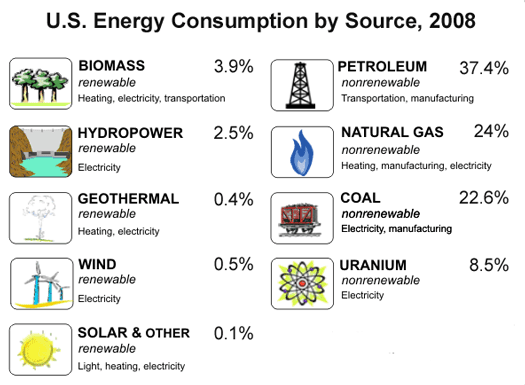We use many different energy sources to do work. Energy sources are classified into two groups — renewable and nonrenewable. Renewable and nonrenewable energy can be converted into secondary energy sources like electricity and hydrogen.

Source: U.S. Energy Information Administration, Annual Energy Review (2008)
Most of Our Energy Is Nonrenewable
In the United States, most of our energy comes from nonrenewable energy sources. Coal, petroleum, natural gas, propane, and uranium are nonrenewable energy sources. They are used to make electricity, to heat our homes, to move our cars, and to manufacture all kinds of products.
These energy sources are called nonrenewable because their supplies are limited. Petroleum, for example, was formed millions of years ago from the remains of ancient sea plants and animals. We can't make more petroleum in a short time.
Use of Renewable Energy Is Growing
Renewable energy sources include biomass, geothermal energy, hydropower, solar energy, and wind energy. They are called renewable energy sources because they are replenished in a short time. Day after day, the sun shines, the wind blows, and the rivers flow. We use renewable energy sources mainly to make electricity.
How Are Secondary Sources of Energy Different?
Electricity and hydrogen are different from the other energy sources because they are secondary sources of energy. Secondary sources of energy — energy carriers — are used to store, move, and deliver energy in easily useable form. We have to use another energy source to make electricity or hydrogen. In the United States, coal is the number one energy source for generating electricity.
Today the cheapest way to get hydrogen is by separating it from natural gas, a nonrenewable energy source. Hydrogen can also be separated from water and from renewables, but hydrogen made from these sources is currently too expensive to compete with other fuels. Scientists are working on ways to make hydrogen from water and renewables more affordable.








